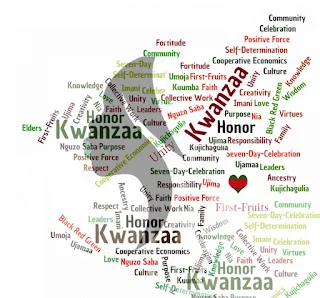Kwanzaa, what the heck is it?
Kwanzaa seven principles are known as the Nguzo Saba. Each of the seven days of Kwanzaa is dedicated to one of seven principles
Kwanzaa what the heck is it
Kwanzaa is a seven-day celebration that begins on December 26 and ends on January 1. The name Kwanzaa is derived from the Swahili term, "matunda ya kwanza", which means first-fruits, Kwanzaa is based on African harvest celebrations.
Kwanzaa has seven symbols that represent the values reflective of a peaceable world. What are the seven principles? Kwanzaa has seven principles known as the Nguzo Saba (n-GU-zo SAH-bah). The seven principles of Kwanzaa are unity, self-determination, collective work and responsibility, cooperative economics, purpose, creativity, and faith.

|
| Kwanzaa seven principles are known as the Nguzo Saba |
The colors of Kwanzaa are black, red and green; Black for the people, red for their struggle, and green for the future and success that comes from their struggle.
Dr. Maulana Karenga introduced Kwanzaa in 1966 to the Africans of the American diaspora as a ceremonial celebration to welcome the first fruit harvests in the Americas. Dr. Karenga created Kwanzaa “to introduce and reinforce seven basic values of African culture which contribute to the building and reinforcing of family, community, and culture among African American people as well as Africans throughout the world African community”.
What Kwanzaa is not
- Kwanzaa is not an African Christmas celebration or a black Christmas.
- Kwanzaa is not a religious holiday, nor is it meant to replace Christmas.
- Kwanzaa is not African rather honors African heritage and culture.
- You do not have to be black to celebrate Kwanzaa as the official Kwanzaa website states, “The principles of Kwanzaa and the message of Kwanzaa has a universal message for all people of good will. It is rooted in African culture, and we speak as Africans must speak, not just to ourselves, but to the world.”
What Kwanzaa is
- People of many faiths, cultures, and ethnic backgrounds celebrate Kwanzaa.
- Kwanzaa is a time for all communities to gather together to celebrate ancestry, African culture, future, and past endeavors and virtues.
- Kwanzaa can be used as a positive force in all communities.
- Kwanzaa pays respect to our beloved ancestors and to our elders for their wisdom, knowledge, honor, and fortitude.
Nguzo Saba
Kwanzaa seven principles are known as the Nguzo Saba.
Each of the seven days of Kwanzaa is dedicated to one of the following principles:
Umoja (oo-MO-jah) means Unity ~ To strive for and to maintain unity in the family, community, nation, and race.
Kujichagulia (koo-jee-chah-GOO-lee-ah) means Self-Determination ~ To define ourselves, name ourselves, create for ourselves, and speak for ourselves.
Ujima (U-Jay-Ma) means Collective Work and Responsibility ~ To build and maintain our community together and make our brothers' and sisters' problems our problems, and to solve them together.Ujamaa (U-Ja-Ma) means Cooperative Economics ~ To build and maintain our own stores, shops, and other businesses and to profit from them together.
Nia (NEE-ah) means Purpose ~To make our collective vocation the building and developing of our community in order to restore our people to their traditional greatness.
Kuumba (koo-OOM-bah) means Creativity ~ To do always as much as we can, in the way we can, in order to leave our community more beautiful and beneficial than we inherited it.
Imani (ee-MAH-nee) means Faith ~ To believe with all our hearts in our people, our parents, our teachers, our leaders, and the righteousness and victory of our struggle.
Together we build awareness that boost harmony, education, and success, below are more links to articles you will find thought provoking.
- Historical African Country Name
- Top 20 Largest Countries in Africa
- How many countries does Africa have?
- Roots of Africanized Christianity Spiritual Songs
- Chocolate Processing Facts History and Recipes
- Awesome Kenyan Woman
- Land is Not For Women in Sierra Leone
- African Kente Cloth Facts
- Accra the Ghanaian Capital Ultimate Mall Experience








